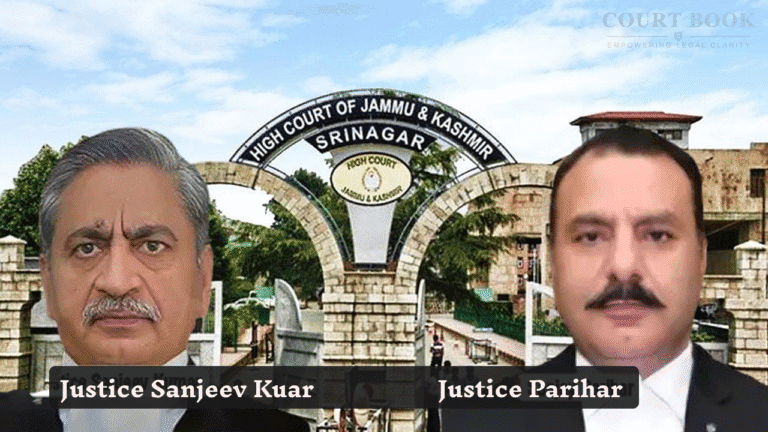Reiterating a key principle of criminal law, the High Court of Jammu & Kashmir and Ladakh has held that Section 106 of the Indian Evidence Act cannot be invoked to substitute weak prosecution evidence without first establishing firm foundational facts.
The Division Bench of Justice Sanjeev Kumar and Justice Sanjay Parihar set aside the trial court’s 2014 conviction of Shamim Ahmad Parray alias Koka Parray and Mst. Gulshana for the alleged murder of Gulshana’s husband, Farooq Ahmad Parray, which occurred during the night of April 1–2, 2002.
“Suspicion, however grave it may be, cannot take the place of legal proof.” — J&K High Court
Background
The case revolved around the sudden death of Farooq Ahmad Parray at his home. His brother-in-law, Gull Parray (PW-1), found his body and informed the police. Rumours of an illicit relationship between Gulshana and Shamim sparked suspicion.
Read Also:- Bombay High Court Grants Interim Injunction to Marico Over Parachute Trademark Infringement
According to the prosecution, Gulshana allowed Shamim to enter the house secretly, where he hit Farooq with a pestle and later throttled him. Based on circumstantial evidence, both were convicted under Sections 302 and 34 RPC and sentenced to life imprisonment.
From the outset, the High Court emphasized the need for a complete and unbroken chain of circumstances to uphold a conviction based solely on circumstantial evidence. It found the trial court's conclusion resting more on conjecture than concrete proof.
“Graver the crime, greater should be the standard of proof.” — High Court Bench quoting Supreme Court precedent
Read Also:- Supreme Court Issues New Guidelines for Retention and Destruction of Administrative Records, 2025
The Bench scrutinized eight circumstantial elements relied upon by the trial court and found them all lacking in strength or clarity.
Unreliable Key Witness: PW-18, the deceased’s minor daughter, gave inconsistent statements—initially failing to mention Shamim’s presence, later contradicting herself about whether she followed her mother or saw the accused through a door crack.
“Her contradictory narration… cannot be treated as a minor inconsistency, especially in a case based on circumstantial evidence,” the Court observed.
Read Also:- Karnataka High Court Grants Interim Relief to Ananth Kumar Hegde in Alleged Road Rage Case
Weapon Recovery Dubious: The pestle allegedly used in the crime was found on a kitchen shelf, accessible to anyone. Medical experts stated it bore no visible blood stains, yet forensic results later claimed otherwise—an inconsistency the Court found unexplained.
“The place of recovery was accessible to one and all... prosecution never explained the inconsistency.”
Planted Evidence Suspected: Shamim’s identity card was allegedly found in a courtyard pit. However, photographs showed the card was plainly visible, and the investigating officer failed to spot it during initial searches.
“The timing and manner of recovery raises strong suspicion of planting,” the Court stated.
Read Also:- Karnataka High Court Stays Termination of 195 ASHA Mentors by State Health Department
Doubtful Motive: The alleged illicit relationship was only suggested after the arrest of the accused, weakening the motive theory. No substantial evidence of such a relationship was provided during the initial investigation.
No Proof of Throttling: Though the post-mortem indicated throttling as cause of death, no signs like bruises or finger marks were found. The method and evidence of strangulation were never explained.
“Once the foundational facts linking the accused are lacking, their silence or non-explanation cannot be held against them,” the Court concluded.
Accordingly, the High Court acquitted both Shamim Ahmad Parray and Mst. Gulshana, setting aside the trial court's judgment and rejecting the reference for sentence confirmation.
Case Title: Shamim Ahmad Parray & Anr. vs State of J&K













